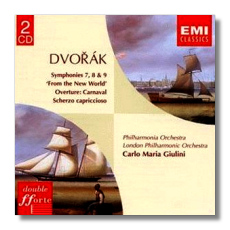
The Internet's Premier Classical Music Source
Related Links
- Dvořák Reviews
- Latest Reviews
- More Reviews
-
By Composer
-
Collections
DVD & Blu-ray
Books
Concert Reviews
Articles/Interviews
Software
Audio
Search Amazon
Recommended Links
Site News
 CD Review
CD Review
Antonín Dvořák

Symphonies
- Symphony #7 in D minor, Op. 70 (1885) *
- Symphony #8 in G Major, Op. 88 (1889)
- Symphony #9 in E minor "From The New World", Op. 95 (1893)
- Scherzo capriccioso Op. 66 (1883)
- Carnival Overture Op. 92 (1891)
* London Philharmonic Orchestra/Carlo Maria Giulini
Philharmonia Orchestra/Carlo Maria Giulini
EMI 68628 Stereo 1962/*1977
Well, there are several ways to get the last triumvirate of Dvořák's Symphonies for a good price. There is the Philips Duo set with Colin Davis, but I think that has been replaced now with the same symphonies but a different conductor. Whatever, you also have Naxos and other budget possibilities. Now, let's be honest. If I had my druthers, my favorite set would not be budget priced. It would be with the Czech Philharmonic with Belalovek. But, for about a third the price you can have this two-disc set and know that you own one of the finest ever.
The first two recordings I owned of the Seventh Symphony were Colin Davis' and Giulini's. I remember (correctly?) the LP cover of the Giulini had an Autumnal cover with trees beneath a blue sky. I recall liking the Giulini better than the Davis. This is still the case. I am ready to argue that the Seventh of Dvořák is the most beautiful symphony ever written. I primarily compared Giulini with another favorite, Jiří Bĕlohlávek and the Czech PO on Chandos 9391 (coupled with the Nocturne for String Orchestra and The Water Goblin).
Now, let's be honest, the Bĕlohlávek is still my favorite and the recording is exemplary, better detailed than the analogue EMI disc. After several listenings, however, I can say that the Giulini is among the best ever. Bĕlohlávek's interpretation is more earthy and sunnier, kind of like dancing with the peasants. Giulini's is more Brahmsian (and that is no criticism) and aristocratic (again, not a condemnation). To use an analogy, it is the musical equivalent of watching a Dr. Zhivago (in Czechoslovakia). It is seamless, and sweeps me away in its vision. Here is an interpretation that is instilled with personality, unlike so many conductors of late. At one point I scribbled, "God, I love the Giulini".
I compared Giulini's Dvořák 8th with another favorite, Szell. This is the Szell on EMI (now available in a set of EMI recordings of historic performances by a bevy of great conductors). At this time Szell had mellowed a tad (and I stress the qualifier) producing a more pleasant recording than he did earlier for Columbia. This Giulini performance equals Szell's. This earlier recording by Maestro Giulini is preferable to his later one on DG. Even the recording is better. Here we have the Philharmonia and another Legge production that is superb.
There are more Dvořák "New World" s in my collection than I can shake a stick at. My personal favorite is the 1940 All-America Youth Orchestra with Stokowski. There are certain pieces that Stokowski did better than anyone and the Dvořák 9th is one. Still, this Giulini is in stereo and the sound is excellent! I get the same kind of feeling here, however, as in the 7th. There is a nobility in this 9th, but it is not earthy. This may suit your tastes just fine as it does mine on occasion.
The shorter pieces have the same wonderful sound and the playing is alert. Here things are a bit more earthy and have a bit more bounce to them. They fill out the second disc, containing the From the New World. This makes for two well-filled discs, lots of wonderful music-making, excellent sound, all for $12.00 at my local haunt. Frankly, if you want a budget Dvořák set, look no farther.
After-thoughts:
I was filing away this set, when I noticed I already had the last three Dvořák Symphonies on a DG "Doubles" set with Kubelík conducting. So, I just had to pull it out to compare it, especially since comparison is inevitable given the price range. For what it is worth, here are my thoughts.
Seventh Symphony: This is what I mean by Giulini being more aristocratic. Kubelík is earthy, attacks are sharper, there is more bounce. The sound, however, has some problems. It is dryer, which affords more interesting interplay detail, but also the sound is more cavernous. It has a gritty sensation to it which, while not irritating, is noticeable. Again, Giulini is more Brahmsian and there is a soft beauty to his version which is not in Kubelík's. I am just glad that I don't have to choose between these two.
After making those comments I took some more time to listen to these two different interpretations of these works. In the 8th and 9th my comments remained the same. Kubelík is more earthy, the sound is definitely leaner. In fact, in the 8th Symphony the sound begins to bother me and I prefer the EMI sound over DG's. In addition, Kubelík's interpretation can feel less pastoral and I prefer the pastoral aspect in this symphony. Still, Kubelík weaves his own magic and I would not want to be without this set. On the other hand, I will keep the Giulini close by for those moments when I want a more Technicolor view of these works. The bottom line is that I would recommend the Giulini set, even if you already own the Kubelík. If it is a matter of having to choose between them, read my comments about the performances and sound, then flip a coin. :-)
Copyright © 1996, Robert Stumpf II


















